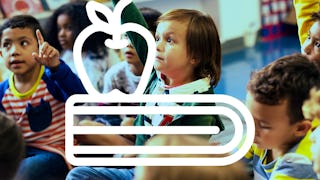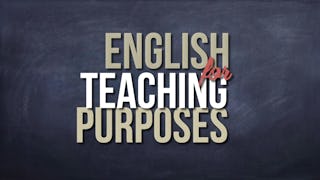Culture and language are inextricably linked. As teachers, we are often faced with the challenge of teaching both language and elements of culture to our English learners. When these students join our classes, they come equipped with knowledge about their own culture, which may or may not have the same norms and values as the new one they find themselves in. It is not our job, as teachers, to prove that one culture is better than another. Instead, it’s our goal to understand how culture influences one’s identity, affirm our students’ identities in the classroom, and use best practices to teach intercultural communicative competence and promote acceptance and respect for those who are different from us.


您将学到什么
Discover new ideas for teaching and assessing cultural knowledge and intercultural communicative competence.
Learn how to incorporate culturally responsive teaching methods into your everyday classroom practices.
Understand the multi-dimensional nature of culture and its importance in teaching English learners.
您将获得的技能
- Curriculum Planning
- Teaching
- Lesson Planning
- Culture
- Cultural Sensitivity
- Diversity Equity and Inclusion Initiatives
- Student Engagement
- Mathematics Education
- Intercultural Competence
- Education and Training
- English Language
- Cultural Responsiveness
- Diversity Awareness
- Pedagogy
- Language Learning
- Instructing
- Cultural Diversity
要了解的详细信息
了解顶级公司的员工如何掌握热门技能

积累特定领域的专业知识
- 向行业专家学习新概念
- 获得对主题或工具的基础理解
- 通过实践项目培养工作相关技能
- 获得可共享的职业证书

该课程共有4个模块
In Module 1, you will learn about the complex construct of culture and the various factors that influence it. We'll explore the concepts of personal, social, cultural, and linguistic identities and how we can affirm our students' identities in the classroom. You will be able to distinguish between the processes of enculturation and acculturation in order to better understand your English learners' perspectives of learning a new culture. We wrap up the module by reflecting on your own cultural background and the ways in which your life experiences and influences relate to your current points of view.
涵盖的内容
6个视频9篇阅读材料3个作业1次同伴评审1个讨论话题
Module 2 is all about becoming comfortable with culture, for both teachers and students. We'll become aware of possible implicit biases and power dynamics between teacher and students that may impact learning in the classroom. We'll introduce the concept of culture shock and discuss ways to help newcomer English learners adjust to their new learning environment. You will discover how asset-based pedagogy models, including Culturally Responsive Teaching (CRT), can foster academic success for English learners. We wrap up the module by evaluating curriculum for elements of culturally responsive teaching.
涵盖的内容
6个视频10篇阅读材料3个作业1次同伴评审1个讨论话题
In module 3, we will learn about the fundamental connection between culture and communication. You'll discover how culture affects language use and how language and thought are windows into cultural points of view. We introduce the crucial construct of intercultural communicative competence (ICC) and best practices to teach and assess it. You'll define a speech community and gain an understanding of the many speech communities your English learners have to navigate on a daily basis. We wrap up the module by evaluating a lesson for elements of ICC.
涵盖的内容
6个视频11篇阅读材料3个作业1次同伴评审1个讨论话题
The final module in the course aims to provide more practical tips for incorporating culture into the classroom across grade levels and subject areas. You will hear from experts about the various ways in which they have implemented culturally responsive teaching in math, STEM, art, and history. We'll review some traditional classroom activities for teaching about culture. You will gain insight into the best methods for and challenges of assessing cultural knowledge and ICC. We'll also highlight awareness of cultural biases in assessment and how to avoid them. The module wraps up with a lesson planning assignment in which you'll be asked to incorporate activities to teach ICC, cultural content knowledge, or implement culturally responsive teaching methods.
涵盖的内容
6个视频12篇阅读材料3个作业1次同伴评审1个讨论话题
获得职业证书
将此证书添加到您的 LinkedIn 个人资料、简历或履历中。在社交媒体和绩效考核中分享。
从 Learning English 浏览更多内容
 状态:免费试用
状态:免费试用Rice University
 状态:免费试用
状态:免费试用Rice University
 状态:免费试用
状态:免费试用Rice University
 状态:预览
状态:预览Universitat Autònoma de Barcelona
人们为什么选择 Coursera 来帮助自己实现职业发展




常见问题
To access the course materials, assignments and to earn a Certificate, you will need to purchase the Certificate experience when you enroll in a course. You can try a Free Trial instead, or apply for Financial Aid. The course may offer 'Full Course, No Certificate' instead. This option lets you see all course materials, submit required assessments, and get a final grade. This also means that you will not be able to purchase a Certificate experience.
When you enroll in the course, you get access to all of the courses in the Specialization, and you earn a certificate when you complete the work. Your electronic Certificate will be added to your Accomplishments page - from there, you can print your Certificate or add it to your LinkedIn profile.
Yes. In select learning programs, you can apply for financial aid or a scholarship if you can’t afford the enrollment fee. If fin aid or scholarship is available for your learning program selection, you’ll find a link to apply on the description page.
更多问题
提供助学金,
¹ 本课程的部分作业采用 AI 评分。对于这些作业,将根据 Coursera 隐私声明使用您的数据。



 中
中


